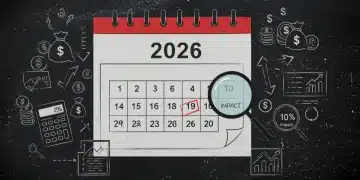Maximizing Your 2025 Tax Refund: New Credits and Deductions

Maximizing your tax refund in 2025 involves understanding and claiming new personal credits and deductions, staying informed about updated tax laws, and strategically planning financial decisions to take full advantage of available tax benefits.
Navigating tax season can be daunting, but understanding the latest credits and deductions can significantly increase your refund. This guide is designed to help you with maximizing your tax refund in 2025: claiming new personal credits and deductions.
Understand tax law changes for 2025
Tax laws are ever-evolving, and staying up-to-date is crucial for accurately filing your taxes and potentially increasing your refund. Understanding the new tax law changes for 2025 can help you navigate the upcoming tax season with confidence.
Several new tax changes may influence your tax refund in 2025. Let’s dig into some of these potential changes, focusing on how they might affect your tax planning and filing strategies.
Potential changes in standard deductions
Standard deductions can significantly impact the amount of taxable income. Keep an eye on any announced changes to these deductions.
Updates to tax brackets
Tax brackets determine the rate at which your income is taxed. Shifts in these brackets can affect your tax liability.

Understanding these and other potential tax law changes is the first step in maximizing your tax refund in 2025. Consult official IRS resources and tax professionals to stay informed and plan accordingly.
In summary, staying informed about tax law changes is critical for optimizing your refund. By understanding potential changes, you can prepare for tax season with greater confidence.
Explore new personal tax credits
Tax credits directly reduce the amount of tax you owe, making them a powerful tool for increasing your tax refund. Exploring new personal tax credits can lead to significant savings.
Several new tax credits might become available or have their eligibility criteria adjusted. Some valuable credits could substantially lower your tax bill. Let’s check some examples:
- Child and Dependent Care Credit: Changes to the income thresholds would allow more middle-class families to claim this credit.
- Earned Income Tax Credit (EITC): Temporary expansions of the EITC for childless adults might become permanent, offering more relief.
- Energy-Efficient Home Improvement Credit: Enhancements might boost the incentive for making energy-efficient upgrades to your home.
Stay updated on the latest developments to leverage these opportunities.
Exploring and understanding these new personal tax credits can lead to significant savings when you file your taxes in 2025.
Review common tax deductions
Tax deductions reduce your taxable income, leading to a lower tax liability. Reviewing common tax deductions ensures you don’t miss out on potential savings.
Many taxpayers miss out on deductions. Here are some common deductions you can review:
Medical expense deductions
If you’ve had significant medical expenses, you may be able to deduct the amount exceeding 7.5% of your adjusted gross income (AGI).
Student loan interest deduction
You can deduct the interest paid on student loans, up to $2,500, even if you don’t itemize.

Charitable donation deductions
Donations to qualified charities are tax-deductible. Keep records of your donations, whether cash or property.
Reviewing these and other common tax deductions helps ensure you’re taking full advantage of opportunities to reduce your taxable income.
Reviewing common tax deductions will assist you in not missing out on tax savings. You’ll be prepared to file accurately and maximize your refund.
Adjust your withholding
Adjusting your withholding involves changing the amount of tax taken out of your paycheck throughout the year. Fine-tuning your W-4 form ensures you’re not overpaying or underpaying taxes.
Many people either overpay or underpay their taxes. Adjusting your W-4 helps:
- Avoid a large tax bill: Reduce the amount withheld if you anticipate owing taxes.
- Increase your take-home pay: Optimize your withholding to reflect your actual tax liability.
- Account for life changes: Update your W-4 after marriage, divorce, or the birth of a child.
Regularly review your withholding to align with your financial situation.
By taking the time to adjust your W-4 form, you can fine-tune your tax obligations and make tax season less surprising.
Contribute to tax-advantaged accounts
Contributing to tax-advantaged accounts is a strategic way to save for the future while reducing your current tax liability. Utilizing these accounts can provide both short-term and long-term financial benefits.
Many accounts offer tax benefits to encourage savings and investment. Here are some of the most common accounts:
- 401(k) and Traditional IRA: Contributions are often tax-deductible, reducing your taxable income.
- Health Savings Account (HSA): Contributions are tax-deductible, plus the funds grow tax-free and can be used for qualified medical expenses.
- 529 Education Savings Plan: Contributions may be tax-deductible at the state level, and the funds grow tax-free for education expenses.
These accounts can influence your refund by reducing your taxable income.
By strategically contributing to tax-advantaged accounts, you can reduce your tax liability and maximize your savings.
Keep detailed records
Maintaining detailed records of your income, expenses, and other financial transactions is essential for accurate tax filing. Good record-keeping simplifies the tax preparation process and ensures you can substantiate any deductions or credits claimed.
Here are some record-keeping practices that can help you:
- Keep receipts for deductible expenses: This includes medical bills, charitable donations, and business expenses.
- Document income from all sources: This includes W-2 forms, 1099 forms, and any other sources of income.
- Use digital tools: Consider using tax software or apps to organize your records electronically.
For accurate filing, ensure to keep good records.
Maintaining detailed records is a critical part of maximizing your tax refund in 2025. This helps you accurately file your taxes and receive all applicable credits and deductions.
Seek expert advice
Seeking expert advice from a qualified tax professional can provide personalized guidance and ensure you’re taking advantage of all available tax benefits. A tax advisor can help navigate complex tax laws and tailor strategies to your specific financial situation.
A tax professional can provide:
- Personalized tax planning: Tailored advice for your specific financial situation.
- Navigation of complex tax laws: Help understanding and applying new tax regulations.
- Identification of overlooked deductions and credits: Ensuring you claim all eligible benefits.
You might get the best help with expert advice.
Consulting a tax professional is a wise investment for maximizing your tax refund in 2025 and ensuring accurate tax filing. Their expertise can help you navigate the complexities of the tax system.
| Key Point | Brief Description |
|---|---|
| 🔄 Tax Law Changes | Stay updated on new tax laws to file accurately. |
| 💰 New Tax Credits | Explore personal credits for more tax savings. |
| 🧾 Deductions | Don’t forget to review common tax deductions. |
| ✅ Detailed Records | Maintain records of income and expenses. |
Frequently Asked Questions
▼
Keep an eye out for potential changes to standard deductions, tax brackets, and specific tax credits. Staying informed ensures accurate filing and helps maximize your refund.
▼
Explore options like the Child and Dependent Care Credit or the Earned Income Tax Credit. Eligibility for these credits can significantly reduce your tax liability.
▼
Adjusting your W-4 form can help you avoid overpaying or underpaying taxes. Regular reviews ensure your withholding aligns with your actual tax liability.
▼
Detailed records simplify the tax preparation process. Organized records helps to substantiate claimed deductions and credits accurately, leading to a larger refund.
▼
Consider seeking expert advice if you have complex financial situations or want to ensure you’re taking advantage of all available benefits. A professional can provide personalized guidance.
Conclusion
Maximizing your tax refund in 2025 involves staying informed, exploring new credits and deductions, adjusting your withholdings, keeping detailed records, and potentially seeking expert advice. By taking these steps, you can navigate tax season with confidence and optimize your financial outcome.





